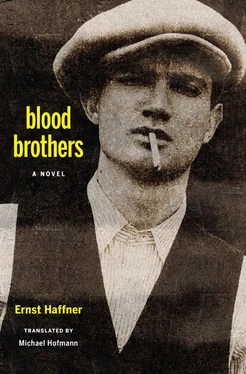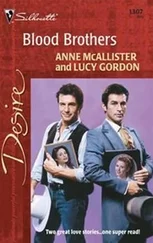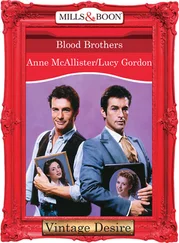Ludwig, Anneliese, Jonny and Fred are sitting between skeletal-looking dossers, come to try and forget the chicken ladder of their lives with a Koks or a Korn with a dot (Koks: rum with a piece of sugar; Korn with a dot: kummel with a drop of raspberry). Jonny orders a round of Koks. The dossers included, of course. An old geezer with a long white beard is finishing his supper. In his left hand he has a half-wrapped sausage end, from which he slices piece after piece with the paring knife in his right, and pops them into his mouth with bread. The ancient face with the sprouting white hair looks like a throwback to those bygone films where the good child by the garden fence throws a coin into the nice old man’s hat. “Well, Grandpa, aren’t you going home yet?” asks Fred. “Home?” The oldster looks up quickly, before returning to his end of sausage. Then: “The manager’s going to throw me out, I already owe him for four nights. I’ve reached my limit, so he says.”
Calm, objective, quite convinced that the manager is well within his rights, the words come out interrupted by the gummy chewing of his food. The heat in the bar is such that sweat is pouring down the creases of his face. Still the old man won’t be induced to take off his coat. Probably he doesn’t have a jacket on underneath. He takes his hat off. His snow-white hair curls over his collar and ears. The coppery face has the eyes of a beaten dog. A second schnapps and a cigar give the beggar a little self-confidence. “Where you from, old man?” He’s been out west, around Wittenbergplatz, begging. Up and down backstairs. Since nine o’clock this morning. And all the fine gentry in that area, their contribution to his welfare totaled seventy-two pfennigs, a couple of crusts of bread, and — the old man shows them off proudly — a pair of glacé gloves that are too much of a pair: in fact, they are two right hands.
As he tells his story, a trace of something resembling indignation comes into his voice: “Four flights up, I’m knocking on the kitchen door. A servant is about to give me a few pfennigs, when along comes the lady of the house. Why are folks always being given money without doing a scrap of work for it, she says. This man is still pretty fit, why shouldn’t he beat the bedroom carpet for it. Well, I lost it. All right, I say, give me your mangy old rug. So your crooked Gustav goes down four flights of stairs, beats the carpet, and back up. Then what does the old bird say? There, my dear chap, now you’ve earned your five pfennigs … And that’s a lady!” In the hostel on Gollnowstrasse, the old man now owes for four nights, and unless he can pay for at least two of them, the manager will throw him out.
“How old are you, Grandpa?” “Seventy-four … no, eighty- … no, seventy-two.” He’s not sure anymore. He was born in Posen. He doesn’t know if he’s German or Polish, and he doesn’t really care. When he was a young man, he was the best and most honest milker — he stresses that — on the whole estate. And then the owner threw him out, because a cow had lashed out at him, and he had kicked her in the stomach. But that didn’t matter. He had to go into the army anyways. Then there were his years as a hobo. Germany, Austria, Switzerland, Italy, France and Spain, all on shanks’s pony. Years, decades. Till shortly before the Great War, when he found himself back in Germany again as an old man. During the war he worked in some munitions factory, and then a gentleman of the road again. More years.
Till he wound up in Berlin, and the four-million-strong city became his highway because he didn’t have enough puff anymore. He doesn’t know where his parents died, nor where his five brothers and sisters are, if they’re even still alive. He has never been inside a cinema. As far as he’s concerned, a book is something with stories in it, and the prime function of newspapers is wrapping things up.
But one thing he’s learned in his long years of experience, be it in Berlin or Italy or some burg in Silesia: rich people don’t do charity. They’d rather turn their dogs loose on beggars or slam doors in their faces. Giving, with a deep reflexive understanding of hunger and misery, is something that only poor people do. The Silesian mineworker, the Italian laborer, the unemployed geezer in Berlin. Tomorrow the old man is headed for proletarian Wedding. He knows and likes the area. “Coppers, only coppers. But at least they add up,” he says, and pensively puts his hat back on. It feels better to be sitting with his hat on.
In a fit of magnanimity, Fred takes a collection from the gang members, to get together money for the old man’s kip. Grand total: two marks, eighty-five pfennigs. The beggar is sceptical when he is given the handful of coppers. They’ve got to be pulling his leg. But then, when the money’s stashed in his pocket, he’s in a hurry to leave. Keep what you got. You never know: maybe the boys will drink up their money, and then want it back. It’s better to scarper. The manager won’t chase him away, he’ll get his money …
Ludwig keeps noticing more ways in which the gang has changed. Fred seems to have become treasurer, and each member is called upon to pay a mark a week into the common exchequer. Johnny, Hans, Fred and Konrad have got a regular kip — with Anneliese — at an invalid jailbird’s place on Badstrasse. Heinz, Erwin, Walter and Georg seem to have somewhere as well, two of them at a time. Wonder where all this money comes from, thinks Ludwig. He doesn’t trust himself to ask.
The boys break up. It’s not possible to have a conversation in this crowd. They decide to ride to Schlesischer Bahnhof, and go to Café Messerstich. Why the Messerstich is called a café, and not a bar, is just as obscure as why it’s called the Messerstich *in the first place. The clientele is made up of organ-grinders, buskers, ragmen (also known as naturalists) and mainly handicapped, male and female beggars. The only thing they like to stab is a piece of roast or at the very least a sausage. The local specialty here are the extraordinary prodigious pigs’ feet in jelly. The gang order, and have a slap-up dinner. Gnawed bones are stacked high on the table, the landlord has to send over the road for more rolls. They all eat like combine harvesters.
A disabled organ-grinder is propping up the bar. His left sleeve hangs down, loose and empty. His single hand is clutching a large glass of schnapps and raising it to his lips. A sip. The schnapps-wet lips purse themselves in a piercing whistle. As on command, two white rats appear from his two jacket pockets. Clamber nimbly up to his shoulders and perch there on their hind legs, begging. Laughter and applause from the other guests. The disabled rat-tamer feels flattered, takes his half-full glass and holds it under the noses of both his pets. Each head leans in and sips a tiny amount of the sweet schnapps. Another whistle. The rats scuttle back into their pockets. Contentedly, the man finishes his drink. The animals go with him on his tour. Stand up and beg when they hear the music, disappear up his trouser leg and reappear at his open collar. Ratty Paul is a celebrity in his profession and is reputed to be doing quite well, thanks to his little friends.
The Blood Brothers are sitting replete and idle over their beer. Anneliese is jiggling about on her chair. Casts fearful glances at a table by the stove. A young lad is sitting there, staring aggressively at the Brothers. And if his eyes happen to meet Anneliese’s, then she gets even more restless and anxious. Suddenly the boy is standing at the gang’s table: “Can I talk to you, Anneliese.” It sounds brutal and menacing. Anneliese is cravenly on the point of obeying when Jonny leaps up: “What do you want with her?” “None of your business, you monkey!” is the ungentle reply. With Jonny’s characteristic speed, he lands the fellow an almighty slap. Before the lad knows what’s happened to him, he’s been hit a second time, and finds himself deposited out on the street. Doesn’t dare go back in. “Who was that, Anneliese?” asks Jonny. Anneliese is crying. “Oh, you know … someone from Friedel Peter’s gang.”
Читать дальше












